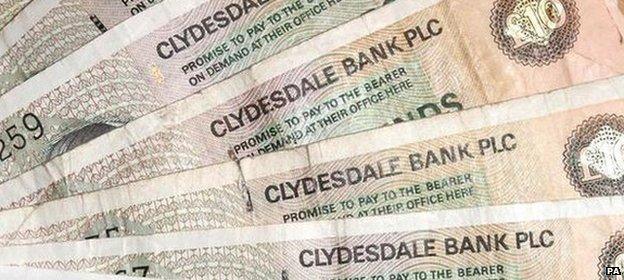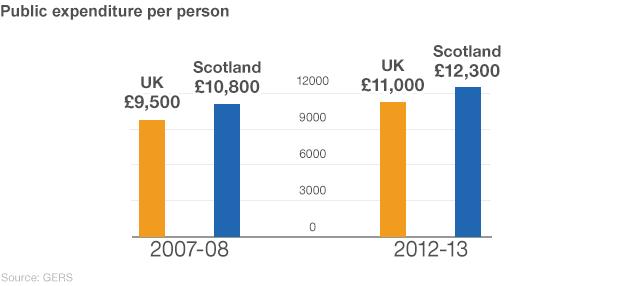Scottish public spending deficit rises, say latest Gers figures
- Published

The tax and spending figures for Scotland were published in the Gers report
The size of Scotland's public spending deficit has risen, according to the latest Scottish government estimates.
The figure, including a geographical share of North Sea oil income, rose to more than £12bn in 2012-13.
Scottish First Minister Alex Salmond said the data also showed tax revenue was £800 higher per head in Scotland compared with the UK.
Chief Secretary to the Treasury Danny Alexander said Scottish ministers had been undermined by their own figures.
The figures were reported in the Government Expenditure and Revenue Scotland (Gers) data, external, seen as a guide to the health of Scotland's public finances, which contain estimates of Scottish government spending, as well as the share of Whitehall budgets received by Scotland.
The £12bn figure, which included tax from oil and gas fields in Scottish waters and capital spending, represented a rise in the deficit from 5% of national output the previous year, to 8.3% in the 2012-13 financial year.
This was compared with a deficit of 7.3% for the UK as a whole that year.
Mr Salmond said: "Today's Gers report confirms what independent commentators and analysts have been making clear - Scotland is one of the wealthiest countries in the world.
"The figures show that tax revenues generated in 2012-13 were £800 higher per head in Scotland compared with the UK, meaning that now for every one of the last 33 years, tax receipts have been higher in Scotland than the UK.
"When looking at the difference between tax receipts and spending on everyday services for 2012-13, today's report shows Scotland and the UK were both in current budget deficit - by almost identical amounts as a percentage of GDP."
North Sea Oil revenue 2001-2013Millions of pounds |
|
|---|---|
| Years | Revenue (Pounds million) | Source: GERS/ONS Public Finance Statistics |
| 2001-2 | 5426 |
| 2002-3 | 5097 |
| 2003-4 | 4284 |
| 2004-5 | 5183 |
| 2005-6 | 9384 |
| 2006-7 | 8924 |
| 2007-8 | 7474 |
| 2008-9 | 12456 |
| 2009-10 | 5991 |
| 2010-11 | 8406 |
| 2011-12 | 11336 |
| 2012-13 | 6632 |

The first minister also said a 41.5% fall in North Sea oil revenue between 2011-12 and 2012-13 was partly down to "unplanned disruption" due to industry investment, which would reduce tax receipts in the short-term but maximise revenues in the future.
Ahead of the 18 September independence referendum, Mr Alexander, said: "The Scottish government's argument for independence has been undermined by their own figures.
"It shows that in 2012-13, the Scottish deficit per person was almost £500 worse than that of the UK.
"By 2016-17 this gap is forecast to have widened to around £1,000 per person - whatever the Scottish government says now, the government of an independent Scotland would be forced to raise taxes and cut public services.
"We are better off together."
The Gers statistics, covering 2012-13, said:
Scotland's estimated net fiscal balance was at a deficit of £17.6bn excluding North Sea revenue, a deficit of £17.1bn including a per capita share of North Sea revenue or a deficit of £12.1bn including a geographical share of North Sea revenue
Total Scottish public sector revenue, not including North Sea oil and gas tax income, was estimated at £47.6bn, or 8.2% of the UK total
Revenue, including a per capita share of North Sea tax income, was estimated at £48.1bn and, with a geographical share of North Sea revenue, was estimated at £53.1bn, or 9.1% of the UK total
Total public sector spending for Scotland by the UK government, Scottish government and other areas of the public sector - plus a per capita share of UK debt interest payments - was £65.2bn, or 9.3% of the UK total
Scotland's public sector budget balance, not including North Sea income, was at a deficit of £14.2bn, a deficit of £13.6bn including a per capita share of North Sea revenue, or a deficit of £8.6bn including a geographical share of North Sea revenue
The UK as a whole ran a current budget deficit, including all North Sea revenue, of £91.9bn, or 5.8% of GDP
Mr Salmond also said that additional Scottish government figures showed Scotland was in a stronger position than the UK over the five years to 2012-13 to the tune of £8.3bn - or £1,600 per person.

- Published12 March 2014
- Published6 March 2013
- Published6 March 2013
- Published23 February 2013
- Published1 February 2013